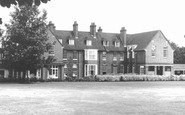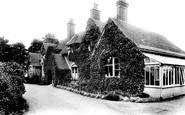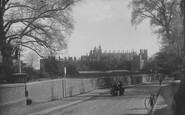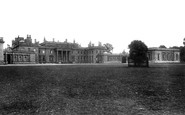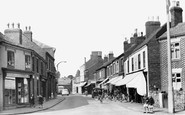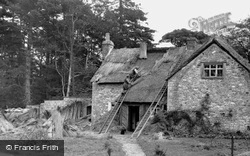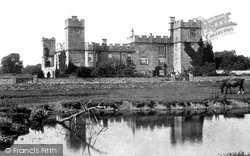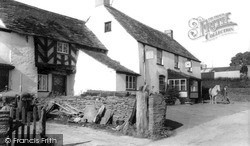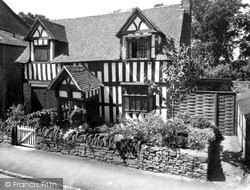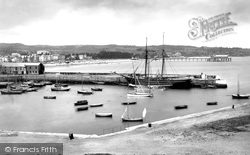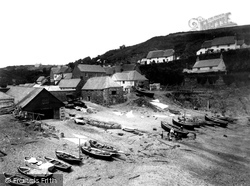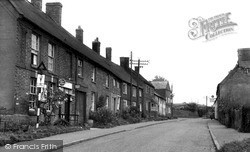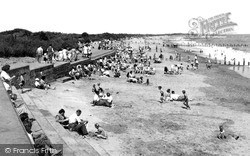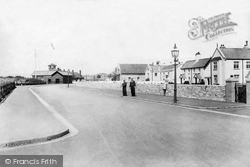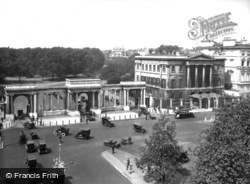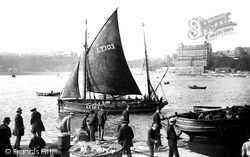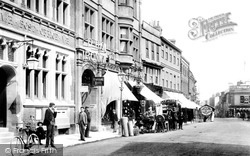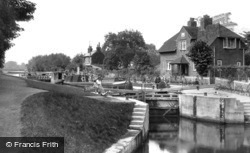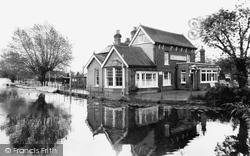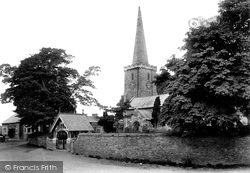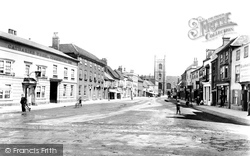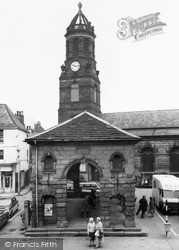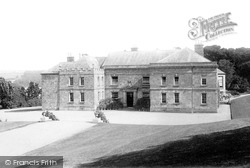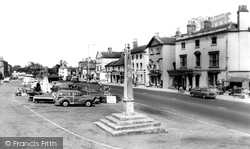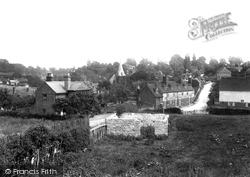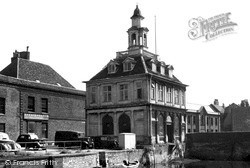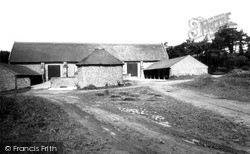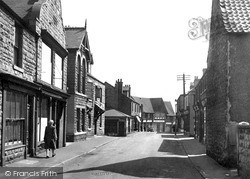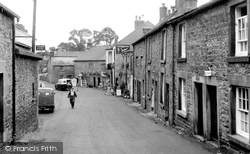Places
18 places found.
Those places high-lighted have photos. All locations may have maps, books and memories.
- Hythe, Kent
- Hythe, Hampshire
- Small Hythe, Kent
- Bablock Hythe, Oxfordshire
- Methwold Hythe, Norfolk
- Hythe, Somerset
- Hythe, Surrey
- Hythe End, Berkshire
- The Hythe, Essex
- Egham Hythe, Surrey
- West Hythe, Kent
- New Hythe, Kent
- Broad Street, Kent (near Hythe)
- Horn Street, Kent (near Hythe)
- Newbarn, Kent (near Hythe)
- Newington, Kent (near Hythe)
- Broad Street, Kent (near Hythe)
- Stone Hill, Kent (near Hythe)
Photos
360 photos found. Showing results 1,961 to 360.
Maps
101 maps found.
Books
10 books found. Showing results 2,353 to 10.
Memories
4,406 memories found. Showing results 981 to 990.
Marsala Road Ladywell The Prefabs
I was only a few months old when our family moved to 122 Marsala Road, Ladywell in 1949. I was ten years of age when we moved from Ladywell to Dartford in August 1959 but there are many different and varied ...Read more
A memory of Lewisham in 1958 by
Rowley Bristow Orthopaedic Hospital 1970
I became a Student Nurse, training for the Orthopaedic Nursing Certificate at The Rowley Bristow Orthopaedic Hospital, on the day before my 17th birthday in January 1970. The hospital was divided into two ...Read more
A memory of Pyrford by
The Ghost
My dad, even though married he was one for playing the field. Mother was taking care of my brother's kids (his wife had died, he was a Flight Sargent), Mother was miles away and Dad played about. One afternoon he had picked up ...Read more
A memory of Royston by
Doddlebugs And V2s Plus!
I moved to Lymington Road, Dagenham, in 1939, across the road from the school. At first I attended Green Lane School - same as Dudley Moor. I even had the same piano teacher. Miss Hoggard. But she gave up on me. In the ...Read more
A memory of Dagenham by
Ashford Cottage Hospital
RE Photo 60335 - Sorry, but this photo is of the building that replaced the original Hospital built (circa 1890) in Station Road (formerly Marsh Street) a few doors from the Baptist Church and next to the town's Gas ...Read more
A memory of Ashford in 1940 by
Granny Trotter
Immediately on the right here was Eton College's Rectors House (?), mum's mum was cook, she was a WWI widow with 5 kids and walked daily from a railway slum in Stoke Gardens Slough. When mum left school in the 30's at 14 and was too ...Read more
A memory of Eton by
During The War 1942
During the summer of 1942 my uncle who was an American soldier lived in several place in the Savernake Forest and eventually was billeted in "the big house" (Tottenham House)and kept a wonderful journal. I will cut and ...Read more
A memory of Savernake Forest in 1942 by
Coalville In The 70s....
So many lovely memories of Coalville. I went to Bardon Hill School and we used to have to walk thru the quarry to get there (would never be allowed now). I remember our teachers, Miss Maloney, Mr Davy, the head and Mrs ...Read more
A memory of Shepshed in 1978 by
Growing Up In Wonderland
In the mid and late forties I attended Kingsmuir Boarding School in what is known today as Alderford Grange. It was owned and mastered by Ms Francis. We were told that the building had once been the Inn attached ...Read more
A memory of Sible Hedingham in 1945 by
The Railway Station At Boat Of Garten
The Speyside Steam Railway is a Heritage Railway which runs from Aviemore to Boat of Garten. I visited in May 2010 with my wife Elizabeth and sister-in-law Margaret on an organised railway touring ...Read more
A memory of Boat of Muiresk in 2010 by
Captions
4,899 captions found. Showing results 2,353 to 2,376.
Here the workmen are carrying out their highly-specialised craft surrounded by the tools of their trade. Note the bundles of thatch standing to the left of the picture.
Dating from the 15th and 16th centuries, Snape was once the seat of the Fitz-Randolphs and Nevilles, Lords of Middleham, and was rebuilt by the Latimers during the reign of Henry VI.
It was one of many castles built by the de Lacy family and was part of a network of castles throughout the area, used to control what was once wild, border country.
Certainly by the early 19th century this was a village in decline.
A number of people, on the beach by the bathing machines in the distant back ground, enjoy the mirror-calm water.
Their attention has been attracted by a fisherman handling a box on the beach, whcih could have been handed down by the person inside the boat.
The White Horse pub can just be seen on the right, and on the left by the school sign are familiar adverts for Lyons Ice Cream and Lyons Tea.
Here, looking towards Ingoldmells Point, are the sandy beach and the sand dunes, a view now radically changed by the more recent sea defences with a massive concave-fronted sea wall forming a promenade
By the time this photograph was taken, the coastguards were taking a greater interest in protecting mariners from the power of the sea than seizing contraband.
It was bought by the Duke of Wellington in 1817 and here were held glittering banquets celebrating the victory at Waterloo until his death in 1852.
A Lowestoft-registered fishing boat slips out to sea unnoticed by the anglers on the harbour. In the background is the imposing, if somewhat overpowering, edifice of the Grand Hotel.
The original market place, as laid out in the Bury St Edmunds' grid pattern devised by Abbot Baldwin in the 11th century, was a good deal larger than it was by the time of this photograph.
27 years after photograph 27159, the chamber has been rebuilt, new gear fitted to the gate sluices and a house built for the lock-keeper by the Thames Conservancy.
A few minutes from the centre of the original village and situated by the weir, this small 19th-century hotel on the banks of the River Lea, with its eight rooms, was, and still is, popular with anglers
The tower may be 13th century, with the needle spire added by the 15th century. The clock was given in 1907 by General Jago Trelawny after a serious illness.
The photographer walked away from the river bridge up Hart Street towards the Town Hall in Market Place and turned back by the Bell Street junction to take this view towards the church with its dominating
The Buttercross was erected in 1734 by the wife of Solomon Dupier, a former garrison commander in Gibraltar, who later lived in the town.
the Godolphin racing stable (ironically owned by Sheikh Makhtoum); it is named after Godolphin Arabian, one of the three Arab stallions from which all British racehorses are descended, and imported by the
This view shows a virtually-deserted Market Place at Bawtry, with a 'half-timbered' Morris Minor prominently parked by the old Buttercross.
Two miles south of Maidstone, this little secretive village perched on a hillside once had thirteen watermills within its boundaries, powered by the two main streams flowing into the River Medway.
Built by Sir John Turner as an exchange for merchants in 1683, it was purchased by the Crown for a Custom House in 1715.
Constructed by the same craftsmen that built Trunch and Knapton churches, the barn is,160ft long, 24ft wide and about 60ft from floor to roof apex.
Shirebrook is a small town on the border with Nottinghamshire which grew up with, and was dominated by, the growth of the Shirebrook and Langwith collieries.
Chair-making was another speciality, and there is still a chair-maker here by the church.
Places (18)
Photos (360)
Memories (4406)
Books (10)
Maps (101)

